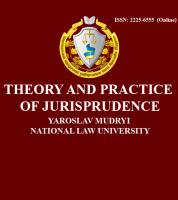Основні напрямки курсу реформ у КНР у 70–90 роках ХХ століття
The main directions of the course of reforms in China in the 70–90 years of the ХХ century
Author(s): Vitaly A. LizogubSubject(s): Economy, Law, Constitution, Jurisprudence
Published by: Національний юридичний університет імені Ярослава Мудрого
Keywords: China; Deng Xiaoping; Zhou Enlai; "the course of reform and opening"; "four Modernizations"; Confucianism; special economic zones
Summary/Abstract: The article is devoted the complex analysis of the reform process in China in the late twentieth century, in particular, main directions, purposes, tasks, peculiarities of the policy of modernization and openness. Examines the main aspects of «socialism with Chinese characteristics», political-legal ideology of the reforms, the influence of traditional Confucian values. Thanks to the detailed study of a significant number of monographic literatures established methods, character, and peculiarities of transformations in the PRC. Today in China there is a transition to innovative model of development. Against this background, growing influence of China. At the same time, the implementation of many projects inland economic cooperation opens up opportunities. China is trying to restore its Imperial status as one of the major players in the global political system through the integration of modern technology, market economy non-democratic system controlled by the Communist party and bureaucracy. This is the phenomenon of the practice of modernization in China. The basis of constructing a model of «socialism with Chinese characteristics» was based on ideas about the appropriate real possibilities of the slow pace of economic progress; use in specific conditions of an agricultural country low criteria, simplified forms and methods of modernization; the development of «own way» reforms. The identity of Chinese socialism is closely linked with commitment to the 2 Chinese traditions of Confucianism. Harmony in social relations, collectivism and mutual aid in human relations, respect for knowledge has influenced ideas about the state and the law, behavioral model. The system of Confucian values remained largely dominant thanks to the versatility, flexibility and usability principles.
Journal: Теорія і практика правознавства
- Issue Year: 1/2016
- Issue No: 09
- Page Range: 1-14
- Page Count: 14
- Language: Ukrainian

